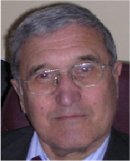|
Plenary
Lecture
The Discovered Characteristics of the Transient Nucleate
Boiling Process to Be Widely Used for Testing of
Materials and New Technologies Development

Dr. Nikolai Kobasko
IQ Technologies Inc, Akron
USA and Intensive Technologies Ltd
Kyiv, Ukraine
E-mail:
NKobasko@aol.com
Abstract:
The nucleate boiling processes are in use in
everyday peoples activity; and they were carefully
investigated mainly for steady state condition. The
transient nucleate boiling processes take place during
quenching of steels and metal alloys; and they were
investigated not enough deeply yet. During last decades
the new characteristics of the transient nucleate
boiling process were discovered which can be formulated
as follows. The duration of the transient nucleate
boiling process is directly proportional to squared size
of a component and inversely proportional to thermal
diffusivity of a given material, depends on
configuration of component, initial temperature and
thermal properties of liquid. The surface temperature of
a component during the nucleate boiling process is
maintained at the level of boiling point of liquid until
heat flux densities during nucleate boiling and
convection become equal. These characteristics were
widely discussed at the WSEAS Conferences. In present
lecture, it is further discussed the possibility of use
of the discovered characteristics in the heat treating
industry. Namely, they can be used for testing of
materials and new intensive technologies development.
The first includes:
Evaluation of the thermal diffusivity of different
kinds of solid materials.
Explanation what Grossmann factor H is.
Development of the new method for testing of different
kinds of quenchants.
Criteria to be used for simplified calculations and
designing of technological systems.
Opportunities for materials savings and environment
improvement.
The second includes:
Optimizing technological IQ 2 processes.
Extended possibility of the low temperature
thermo-mechanical heat treatment (LTMT).
Modifying of the cryogenic treatment of materials.
Optimizing of the continuous casting process for
receiving nano particles after intensive cooling.
Condition for super strengthening of steels.
Reduced cost of the technological process.
Monitoring of the process of phase transformation and
residual stress distribution.
These aspects will be discussed at the WSEAS Conference
with the aim of saving expensive materials and improving
environment condition.
Brief Biography of the Speaker:
Dr. Kobasko received his Ph.D. from the National Academy
of Sciences of Ukraine. He is a leading expert on
quenching and heat transfer during the hardening of
steels. He was the Head of the laboratory of the Thermal
Science Institute of the National Academy of Sciences of
Ukraine. He is Director of Technology and Research and
Development for IQ Technologies, Inc., Akron, Ohio and
supervisor of Intensive Technologies, Ltd, Kyiv,
Ukraine. The aim of both companies is material savings,
ecological problem-solving, and increasing service life
of steel parts. He is an ASM International Fellow
(FASM). Dr. Kobasko is the author and co-author of more
than 250 scientific and technical papers, several books
and more than 30 patents and certificates. He received
the Da Vinci Diamond Award and Certificate in
recognition of an outstanding contribution to thermal
science. Dr. Nikolai Kobasko was Editor-in-Chief and
Co-Editor of the WSEAS Transactions on Heat and Mass
Transfer; and is currently a member of the Editorial
Board for the International Journal of Mechanics (NAUN)
and the Journal of ASTM International (JAI). The new
characteristics of transient nucleate boiling processes
were discovered by him. These characteristics are basics
for new technologies development and new method of
testing materials which are discussed in the lecture.
|
